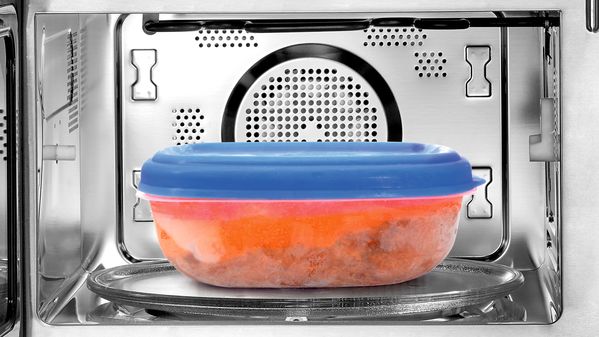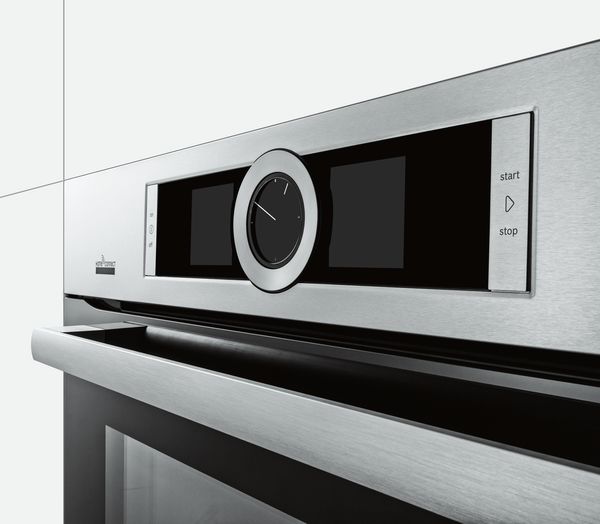Your comprehensive guide to Appliance Issues
Troubleshooting

Microwave not heating properly
When reheating food in your microwave, factors like freezing degree, food size, and weight can impact cooking time. Oversized cookware or heavy items may hinder rotation, leading to uneven heating. Ensure the glass plate rotates freely and is level. Clean any debris from the plate and rotation ring, then reassemble them dry.
You may test the microwave's preheating function by reheating water in a cup. Proper reheating indicates normal operation; if not, we suggest scheduling a repair with one of our highly trained and qualified Bosch engineers.

Microwave not rotating
If your microwave's turntable no longer turns, several factors could be at play. Oversized cookware, heavy items, food debris buildup may obstruct rotation. Try cleaning any debris from the plate and rotation ring, then reassemble them dry.
If the issue persists, we advise against attempting repairs yourself. Instead, book a repair with one of our highly trained and qualified Bosch engineers.
Microwave smells
If your microwave emits unpleasant odors, thorough cleaning is essential. Start by cleaning it with soapy water, letting the suds soak without turning on the appliance. For tougher stubborn residues, consider using our approved degreaser for effective cleaning. Afterward, wipe the microwave with a soft cloth. For persistent odors, repeat the process. In case of smoke smell, promptly identify and clean burnt-on spills.
If the issue persists, we advise against attempting repairs yourself. Instead, book a repair with one of our highly trained and qualified Bosch engineers.

Microwave making loud noises
Experiencing noises from your microwave? It's often due to the magnetron, which produces microwaves. These sounds are typically normal and pose no cause for concern. However, if your microwave emits loud or unusual noises during standby, it could indicate a fan malfunction. Monitor if the noise subsides over time.
If the issue persists, we advise against attempting repairs yourself. Instead, book a repair with one of our highly trained and qualified Bosch engineers.

Microwave not working
Experiencing issues with your microwave not starting? Several factors could be the culprit, such as an active control lock, improper door closure, or control panel problems. Refer to your manual for troubleshooting guidance. If the microwave abruptly stops, it might be due to a wrong setting selection. Reset the control panel and resolve communication issues by unplugging the unit or switching off the circuit breaker for 2-3 minutes.
If the issue persists, we advise against attempting repairs yourself. Instead, book a repair with one of our highly trained and qualified Bosch engineers.
Error Codes

E11
The touch keys are not operating properly. This may be due to condensation on the keypad.
1. Clean the control panel with a dry cloth.
2. Disconnect the appliance from the power supply by switching off the fuse in the fuse box and switch it back on after 10 seconds.
If the issue persists, we advise against attempting repairs yourself. Instead, book a repair with one of our highly trained and qualified Bosch engineers.

E and a number appears on the display
A malfunction has occurred. Note any error codes that may appear on the display.
Disconnect the appliance from the power supply by switching off the fuse in the fuse box and call contact our customer care team at +65 6751 5000 for assistance or book a repair with one of our highly trained and qualified Bosch engineers.

E and a number appears on the display and the control beeps
This is a fault/error code.
1. Press any button to stop beeping.
2. Reset oven if necessary.
If the issue persists, we advise against attempting repairs yourself. Instead, book a repair with one of our highly trained and qualified Bosch engineers.
Cleaning Tips
How to clean microwave?
Looking to clean your microwave quickly and effectively? Prevent splashes and dirt buildup by using a microwave-safe lid while heating. If your microwave is already dirty, don't worry. Start by removing the turntable and washing it in soapy water. Wipe the interior with a damp cloth, avoiding the use of the rough side of a universal sponge to prevent scratching. For tougher stubborn residues, consider using our approved degreaser for effective cleaning. Never use oven cleaner. Ideally, clean the microwave promptly after use to ensure quick and easy maintenance.
Can I clean my microwave with lemon juice?
Considering cleaning your microwave with lemon juice? While it's a common household item, we advise against it. For proper cleaning, start by removing the turntable and washing it in soapy water. Wipe the interior with a damp cloth, avoiding the use of the rough side of a universal sponge to prevent scratching. For tougher stubborn residues, consider using our approved degreaser for effective cleaning. Never use oven cleaner. Ideally, clean the microwave promptly after use to ensure quick and easy maintenance. Lemon juice isn't necessary for effective cleaning.

How to get rid of burnt smell?
To clean a microwave with burnt-on food start by removing the turntable and washing it in soapy water. Wipe the interior with a damp cloth, avoiding the use of the rough side of a universal sponge to prevent scratching. For tougher stubborn residues, consider using our approved degreaser for effective cleaning. Never use oven cleaner. Ideally, clean the microwave promptly after use to ensure quick and easy maintenance.
Frequently Asked Questions
What can you put in the microwave?
Unsure about what you can heat or prepare in your microwave? Avoid placing eggs or food with shells inside, as the risk of explosion is high. Exercise caution with cherry stone pillows, as they can quickly overheat, leading to burning and an unpleasant odor. Follow the manufacturer's instructions for proper use. Additionally, refrain from using the microwave for dehydrating food; opt for a food dryer or dehydrator instead. Avoid using metal dishes or aluminum foil to prevent damage to your microwave from sparks. Melamine dishes should also be avoided as they may melt and deform. However, honey can be liquefied at suitable temperatures in the microwave. By using your microwave appropriately and avoiding items that don't belong, you can enjoy its longevity, as microwaves are durable appliances with no expiry date.
If you have any further questions, please contact our customer care team at +65 6751 5000. We're delighted to assist you.

How a microwave works
Microwaves are electromagnetic waves that convert energy into heat, effectively cooking food. If you have any additional questions or concerns, please don't hesitate to contact our customer care team at +65 6751 5000. We're here to assist you with delight.
